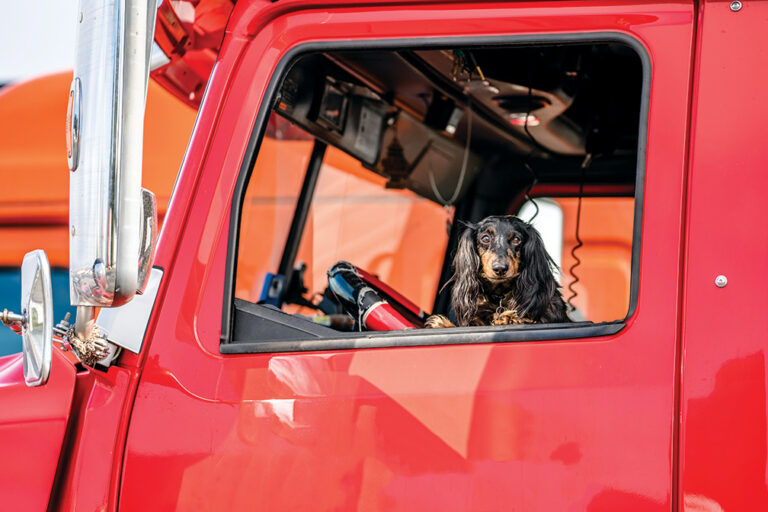For many truckers, every day is “bring your pet to work day.” With all of the benefits pets provide, this is not surprising. Pets were providing humans with companionship long before the term “support animal” was coined.
Animal companions have proven to be beneficial to sufferers of Post-Traumatic Stress Disorder (PTSD) and other ailments.
It wouldn’t be accurate to claim that all drivers suffer from PTSD — although some certainly may — but almost every driver who spends a lot of time away from family and friends has experienced feelings of loneliness and anxiety. Pets can help mitigate those feelings just by being there. The bond between human and an animal is often as strong as a family relationship. Indeed, many owners consider their pet a part of the family.
If you’re an employee of a trucking company and want to take a pet along for the ride, make sure company rules don’t prohibit the practice. Some carriers prohibit pets on their trucks for insurance or maintenance reasons.
Because some pets require periodic walks and potty breaks, the driver has a chance to get a bit of fresh air and exercise, when he or she would otherwise have spent a rest break sitting in the truck.
The most popular highway pet is a dog, which comes with the added benefit of increasing security. Some dogs, of course, are large enough to provide protection from an intruder, but almost any dog can provide a warning if danger approaches. Many owners sleep better knowing Fido will alert them to anything resembling danger. In addition, the mere presence of a dog can deter would-be criminals, who would rather move on to easier prey.
Dogs aren’t the only pet option for truck drivers. Cats are also popular, and birds, reptiles and rodents have been spotted in truck cabs as well. Some drivers prefer more interaction with their pets, such as petting or cuddling, while others are content just knowing their companion is there.
Whatever pet you choose, it’s important to prepare for another creature in the truck. Stock up on supplies like food, bedding, litter or other needed products before a run begins. Choices will be limited on the road, especially at truck stops and convenience stores, and some products may not be available at all.
Water quality can vary from state to state, so some drivers prefer to provide bottled water for their pets. This practice can get expensive on the road, however. Most grocery chains have a “value” brand of drinking water. If your pet is large, consider stocking up on gallon bottles rather than buying more expensive, smaller bottles on the road.
While sharing human food with a pet may be a treat and can help animals stay happy until their regular diet can be resumed, it isn’t the healthiest option for the pet — and it can cause health issues. Every pet is different, of course, but it helps to know what diet is good for your pet, and plan for it.
Medical care is important for traveling pets. It’s best to make sure each animal is up to date on vaccinations and prescription medications. Heartworm medication, for example, is crucial for dogs. Even over-the-counter medications like vitamins may be hard to find on the road.
Just like the driver, traveling pets will need a periodic restroom break. Dogs and cats that aren’t trained to a litter box will need an area they can roam. Some truck stops and rest areas provide designated pet-walking areas for this purpose.
When outside the truck, every animal should be on a leash. Even the most well-behaved pets can react to the presence of other animals or the odors those animals leave behind. High-traffic areas like truck stops can be deadly for loose animals, who may panic and be difficult to get under control. Flight is a natural response to fear.
For dogs and cats, harnesses provide more control than collars. Some harnesses even come with built-in handles that can be used to pick up or control the animal if needed. As a bonus, some harnesses are trimmed with reflective tape that can help you (and others) spot the animal in poor lighting.
Public pet-walking areas come with a danger that owners should be aware of: Pets can pick up the eggs and larvae of parasites like tapeworms on their feet as they walk through areas where an infected pet has been. These sometimes work their way into the pet’s body, either by penetrating the skin or by being ingested later as the animal cleans itself. If your pet uses these areas, it’s important that it be tested regularly for worms.
You’ll need to submit a stool sample to your veterinarian for testing. You may be able to see some types of worms in the feces your dog or cat leaves behind, but many parasites are too small to see without a microscope. Have the testing done by a professional.
If you suspect your pet has worms, your veterinarian can prescribe the right treatment.
If your pet isn’t spayed or neutered, consider having this done. Unneutered pets can instinctively be territorial and can become aggressive towards other pets and even people. Additionally, unneutered cats can feel the urge to mark their territory by spraying urine deposits around their living area — in this case, the enclosed cabin of your rig. Those odors can be very difficult to get out of carpets and bedding.
For caged pets such as birds, reptiles or rodents, a periodic change of bedding or litter is necessary to maintain good health and to keep the cab smelling fresh. You’ll want to bring a supply along.
Finally, some safety rules are in order. Pets must never interfere with the safe operation of a vehicle. Holding a dog or cat in the driver’s lap while going down the road isn’t cute — it’s irresponsible. In addition, having a pet wandering on the floor around the driver’s feet can interfere with operation of the clutch, brake and throttle.
Some pets are well-behaved and will stay in one area, such as the sleeper berth or the passenger seat; however, others need to be restrained in a carrier or crate when the truck is in motion. Make sure you have a means of restraining your pet if it becomes necessary.
If you have a pet traveling over the road, enjoy the companionship — and make sure both you and your pet are safe and healthy.
Cliff Abbott is an experienced commercial vehicle driver and owner-operator who still holds a CDL in his home state of Alabama. In nearly 40 years in trucking, he’s been an instructor and trainer and has managed safety and recruiting operations for several carriers. Having never lost his love of the road, Cliff has written a book and hundreds of songs and has been writing for The Trucker for more than a decade.








I had no idea some carriers allow drivers to take pets! My son wants to become a truck driver after high school. He would definitely love this article! https://www.mitchelltransport.co/